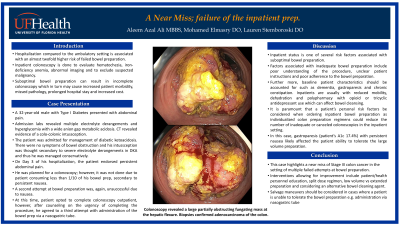Monday Poster Session
Category: Colon
P1626 - A Near Miss: Failure of the Inpatient Prep
Monday, October 23, 2023
10:30 AM - 4:15 PM PT
Location: Exhibit Hall

Has Audio

Aleem A. Ali, MD
University of Florida College of Medicine Jacksonville
Jacksonville, FL
Presenting Author(s)
Award: Presidential Poster Award
Aleem A. Ali, MD, Mohamed Elmasry, DO, Andrew Flint, DO, Lauren Stemboroski, DO
University of Florida College of Medicine Jacksonville, Jacksonville, FL
Introduction: Factors associated with inadequate bowel preparation include poor understanding of the procedure, unclear patient instructions, dementia, gastroparesis and inpatient opioid use. Bowel preparation should be individualized based on patient’s risk factors to ensure timely colonoscopic evaluation.
Case Description/Methods: A 32-year-old male with Type I Diabetes Mellitus presented with abdominal pain. Admission labs revealed multiple electrolyte derangements, hyperglycemia with a wide anion gap metabolic acidosis. The patient was admitted to ICU for management of diabetic ketoacidosis. A CT revealed evidence of colo-colonic intussception involving the splenic flexure and the proximal transverse colon. There were no symptoms of bowel obstruction and his intussception was thought secondary to his severe electrolyte derangements in DKA and thus he was managed conservatively.
On his third day of hospitalization, the patient still reported vague abdominal pain. He was planned for a colonoscopy; however, it was not done due to patient consuming less than 1/10 of his bowel prep, secondary to persistent nausea. A second attempt at bowel preparation was, again, not successful due to nausea. At this time, patient opted to complete colonoscopy outpatient, however, after counseling on the urgency of completing the procedure, he agreed to complete the bowel prep via a dobhoff tube.
Colonoscopy revealed a large fungating mass at the hepatic flexure subsequently confirmed adenocarcinoma.
Discussion: Inpatient status is one of several factors associated with suboptimal bowel preparation leading to incomplete colonoscopy procedures which may cause increased patient morbidity, missed pathology, prolonged hospital stay and increased cost. In this case gastroparesis (patient’s A1c 17.4%) with persistent nausea likely affected the patient ability to tolerate large volume preparation. Individualized colon preparation regimens based on personal risk factors could reduce the number of inadequate or canceled colonoscopies in the inpatient setting. Inpatient colonoscopy is usually done to evaluate hematochezia, iron-deficiency anemia, abnormal imaging and to exclude suspected malignancy. This case highlights a near miss of Stage III colon cancer in the setting of multiped failed attempts at bowel preparation. It is paramount that patient’s personal risk factors be considered when ordering inpatient bowel preparation and salvage maneuvers be considered in cases where a patient is unable to tolerate the bowel preparation.

Disclosures:
Aleem A. Ali, MD, Mohamed Elmasry, DO, Andrew Flint, DO, Lauren Stemboroski, DO. P1626 - A Near Miss: Failure of the Inpatient Prep, ACG 2023 Annual Scientific Meeting Abstracts. Vancouver, BC, Canada: American College of Gastroenterology.
Aleem A. Ali, MD, Mohamed Elmasry, DO, Andrew Flint, DO, Lauren Stemboroski, DO
University of Florida College of Medicine Jacksonville, Jacksonville, FL
Introduction: Factors associated with inadequate bowel preparation include poor understanding of the procedure, unclear patient instructions, dementia, gastroparesis and inpatient opioid use. Bowel preparation should be individualized based on patient’s risk factors to ensure timely colonoscopic evaluation.
Case Description/Methods: A 32-year-old male with Type I Diabetes Mellitus presented with abdominal pain. Admission labs revealed multiple electrolyte derangements, hyperglycemia with a wide anion gap metabolic acidosis. The patient was admitted to ICU for management of diabetic ketoacidosis. A CT revealed evidence of colo-colonic intussception involving the splenic flexure and the proximal transverse colon. There were no symptoms of bowel obstruction and his intussception was thought secondary to his severe electrolyte derangements in DKA and thus he was managed conservatively.
On his third day of hospitalization, the patient still reported vague abdominal pain. He was planned for a colonoscopy; however, it was not done due to patient consuming less than 1/10 of his bowel prep, secondary to persistent nausea. A second attempt at bowel preparation was, again, not successful due to nausea. At this time, patient opted to complete colonoscopy outpatient, however, after counseling on the urgency of completing the procedure, he agreed to complete the bowel prep via a dobhoff tube.
Colonoscopy revealed a large fungating mass at the hepatic flexure subsequently confirmed adenocarcinoma.
Discussion: Inpatient status is one of several factors associated with suboptimal bowel preparation leading to incomplete colonoscopy procedures which may cause increased patient morbidity, missed pathology, prolonged hospital stay and increased cost. In this case gastroparesis (patient’s A1c 17.4%) with persistent nausea likely affected the patient ability to tolerate large volume preparation. Individualized colon preparation regimens based on personal risk factors could reduce the number of inadequate or canceled colonoscopies in the inpatient setting. Inpatient colonoscopy is usually done to evaluate hematochezia, iron-deficiency anemia, abnormal imaging and to exclude suspected malignancy. This case highlights a near miss of Stage III colon cancer in the setting of multiped failed attempts at bowel preparation. It is paramount that patient’s personal risk factors be considered when ordering inpatient bowel preparation and salvage maneuvers be considered in cases where a patient is unable to tolerate the bowel preparation.

Figure: A large partially obstructing, exophytic, fungating mass was seen at the hepatic flexure
Disclosures:
Aleem Ali indicated no relevant financial relationships.
Mohamed Elmasry indicated no relevant financial relationships.
Andrew Flint indicated no relevant financial relationships.
Lauren Stemboroski indicated no relevant financial relationships.
Aleem A. Ali, MD, Mohamed Elmasry, DO, Andrew Flint, DO, Lauren Stemboroski, DO. P1626 - A Near Miss: Failure of the Inpatient Prep, ACG 2023 Annual Scientific Meeting Abstracts. Vancouver, BC, Canada: American College of Gastroenterology.

